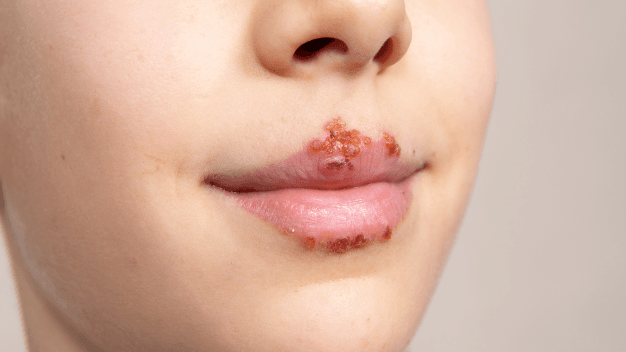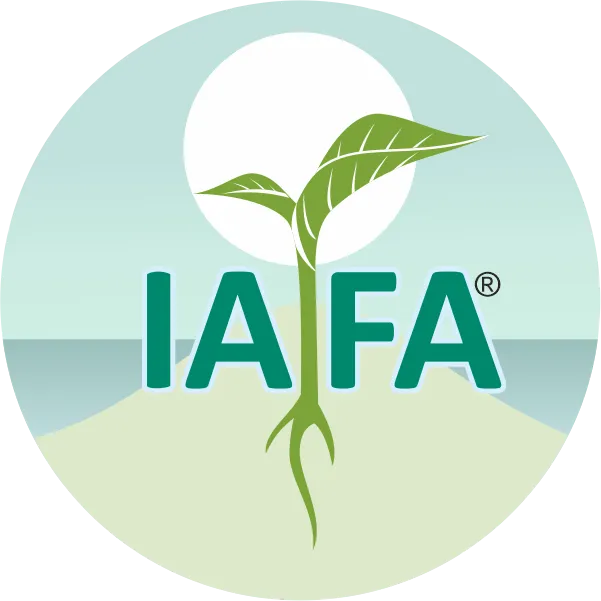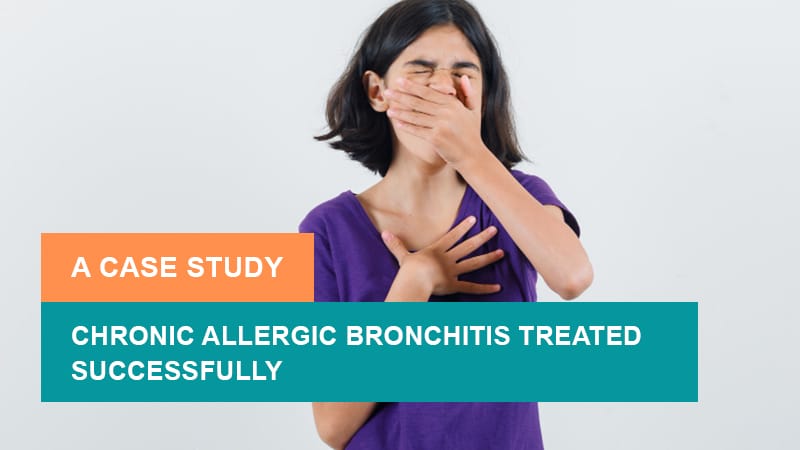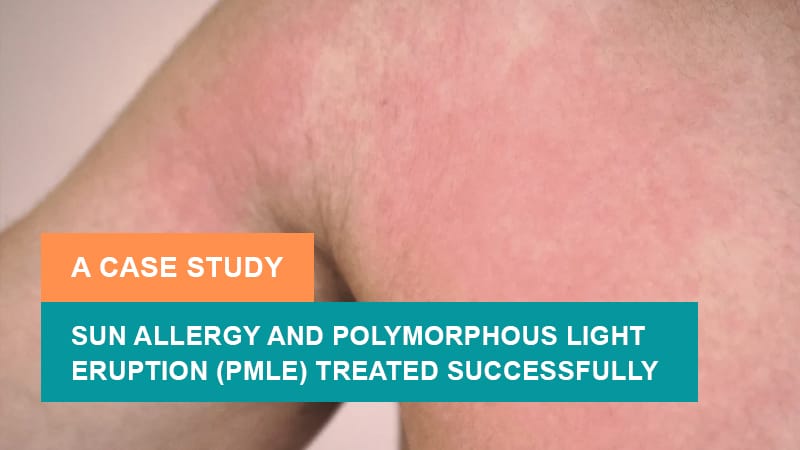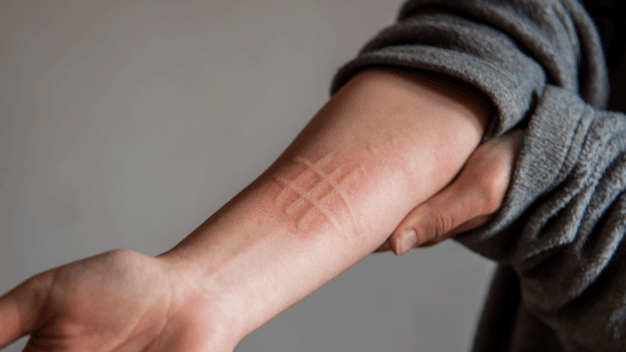On This Page
Introduction
Are you suffering from painful blisters, burning sensations, or itching around the mouth or genital area? Do you experience recurrent outbreaks triggered by fatigue, low immunity, or stress? If yes, it’s time to explore a long-lasting solution to your problem.
A contagious viral infection remains dormant in the body and reactivates when immunity weakens due to stress, poor diet, or lifestyle imbalances is known as Herpes Simplex Virus (HSV-1, HSV-2). It is a highly contagious viral infection that leads to oral and genital herpes, causing pain, discomfort, and emotional distress.
In Ayurveda, it is correlated with spreading skin disorder (Visarpa), chronic skin diseases (Pitta-Kapha dominant Kushta), externally acquired infection (Aagantuj Vyadhi), arising due to Pitta and Rakta imbalance, weak immunity (Oja Kshaya) and Kapha accumulation.
To break the cycle of recurrence of HSV, Ayurveda focuses on detoxification (Shodhana), immune strengthening, and dosha balancing through detoxification therapies like purgative therapy (Virechana- Sadya Mridu Virechana) and bloodletting therapy (Rakta Mokshana), and use of various herbs like Neem, Haridra, Guduchi, and Manjistha, etc. as well as dietary modifications, stress management, Rejuvenation therapy (Rasayana Karma), Yoga therapy, etc.
If you are suffering from HSV, don’t worry, IAFA and its expert team, led by Dr. Sahil Gupta, have an effective and safe Ayurvedic solution to manage HSV and restore your health. Book your consultation today and take control of your HSV.
What is the Herpes Simplex Virus (HSV)?
The common viral infection is caused by the herpes simplex virus which primarily affects the mucous membranes and skin. It is a highly contagious disease that occurs through direct contact with the skin, saliva, or bodily fluids of the infected person.
This virus generally affects the oral and genital parts of the body. The virus, once infected in the body, remains in dormant condition and recurrent outbreaks occur during illness, stress and when the immune system is weakened.
What is the Herpes Simplex Virus (HSV) – As Per Ayurveda?
In Ayurveda, as such HSV is not mentioned but its symptoms are often correlated with conditions like Visarpa, Aagantuja Vyadhi, Pitta-Kapha dominant skin condition, etc. All these conditions are attributed to Pitta, Kapha, and Rakta imbalance along with a weakened immune system which predisposes the body to external infections. Weakened Oja, stress, and accumulation of toxin (Ama) in the body trigger recurrent outbreaks of HSV.
Who Gets Affected by Herpes Simplex Virus (HSV)?
HSV remains dormant in the body after the first infection, and it can reactivate when the immune system is weakened due to any factor like illness, stress, etc. Herpes Simplex Virus can affect anyone, regardless of age, gender, background, etc. It is a highly contagious viral disease that spreads directly through saliva, skin-to-skin contact, or bodily fluids of an infected person. Individuals who get easily affected by herpes simplex virus are as follows:-
- Due to stress, illness, or medical conditions like HIV/AIDS, individuals who have weakened the immune system.
- Healthcare workers, athletes, etc. who have frequent skin contact with other individuals.
- People engaging in unprotected sexual activity are at higher risk of herpes simplex virus, especially genital herpes.
- Newborns are also easily affected by HSV if exposed to viruses from an infected mother during birth.
- People with poor lifestyle habits and who are under extreme stress.
How Common is the Herpes Simplex Virus (HSV)?
As per a recent survey by WHO, approximately 3.8 billion people under age 50 i.e. approximately 64% globally have herpes simplex virus type 1 (HSV-1) infection, the main cause of oral herpes, and approximately 520 million people aged 15- 49 i.e. 13% worldwide have herpes simplex virus type 2 (HSV-2) infection, the main cause of genital herpes.
As per a study of 2016, HSV type 2 prevalence is highest among women and in the WHO African Region. More women i.e. approximately 313.5 million than men that is around 178.0 million were infected by HSV- 2. The number of individuals with oral HSV-1 was largest in the WHO Southeast Asia Region, followed by the Western Pacific Region.
In India, studies indicate a high seroprevalence of HSV-1 type, with some studies reporting around 80% in adults and, a seroprevalence of 50.0% for children which indicates seroprevalence increases with age. Seroprevalence of HSV-2 is also high, ranging from 7.9 % to 14.6 % in population-based studies.
Types of Herpes Simplex Virus (HSV)
Herpes Simplex Virus (HSV) is classified mainly into two types:
1) Herpes Simplex Virus Type 1 / HSV-1 / Oral Herpes
HSV-1 mainly causes oral herpes, in which blisters and cold sores are formed around the lips and mouth. However, HSV-1 can also result in genital herpes through oral-genital contact. It mainly spreads through direct skin-to-skin contact with an infected person, kissing, close facial contact, sharing razors, utensils, oral sex, etc.
Oral sex can lead to the spreading of HSV-1 into the genital area. In HSV-1 symptoms like cold sores, burning sensation, painful ulcer, fever, swollen lymph nodes, etc. occur. Stress, weakened immunity, fever, excessive exposure to the sun, hormonal changes, etc. can trigger and reactivate HSV-1.
2) Herpes Simplex Virus Type 2 / HSV-2 / Genital Herpes
Genital herpes is mainly caused by HSV-2, which results in painful blisters and ulcers in the genital and anal regions of the individuals. It mainly spreads through sexual contact that may be vaginal, anal, or oral. It also spreads through skin-to-skin contact with infected areas. Even without visible sores, it can spread from one person to another. In newborns, it can occur from an infected mother. HSV-2 results in a burning sensation, itching, etc. before the sores appear.
During the first outbreak flu-like symptoms, i.e. fever, body aches, swollen lymph nodes, etc. occur. Painful blisters form in the genital, thigh, and anal regions. Painful urination near the urethra due to ulceration occurs in HSV-2. The weakened immune system, illness, stress, menstruation, and fatigue are the main triggers of HSV-2 and also major causes of HSV-2 reactivation.
Causes of Herpes Simplex Virus
- Direct skin-to-skin contact due to touching, kissing, or sexual contact.
- Due to the sharing of contaminated objects like razors, lip balm, towels, utensils, etc.
- Stress
- Lack of sleep
- Chronic illness
- Unprotected sexual contact
- Hormonal changes
- From infected mother to newborn transmission
- Weakened immunity due to diseases like HIV, etc.
Causes of Herpes Simplex Virus – As Per Ayurveda
- Incompatible diet (Viruddha Ahara)
- Poor digestive fire (Mandagni)
- Toxin accumulation (Ama Uttapati)
- Weakened immunity (Oja Kshaya)
- Pitta Dosha is aggravated by excessive consumption of spicy (Katu), sour (Amla), and fermented foods.
- Improper sleep (Anidra)
- Kapha Dosha aggravation
- Excessive sun exposure (Ati Ushana Tapa)
- Overindulgence in sexual activity (Ati-Sehwas)
- Mansika Nidana which results in stress and anxiety-like anger (Krodha), grief (Shoka), etc.
Symptoms of Herpes Simplex Virus
Symptoms of HSV-1 (Oral Herpes)
- Painful cold sores or blister formation around the lips, face, and mouth.
- Swollen lymph nodes
- Burning sensation
- Tingling sensation
- Fever
- Headache
- Fatigue
- Sore throat
- Difficulty in swallowing
Symptoms of HSV-2 (Genital Herpes)
- Fluid-filled painful blisters on genitals, thighs, and buttocks.
- Itching
- Discomfort in the affected area
- Swollen lymph nodes
- Flu-like symptoms
- Burning sensation
Symptoms of Herpes Simplex Virus – As Per Ayurveda
Symptoms of HSV-1 (Oral Herpes)
- Burning sensation (Daha)
- Blister formation (Paka)
- Severe itching (Kandu)
- Swelling (Shotha)
- Loss of taste (Aruchi)
- Headache (Shirashool)
- Fever (Jwara)
Symptoms of HSV-2 (Genital Herpes)
- Painful pustules or blisters (Pidika)
- Itching (Kandu)
- Painful urination (Mutra Kricha)
- Fatigue (Shrama)
- Burning sensation (Daha)
- Blood vitiation which results in chronic recurrence
Diagnosis of Herpes Simplex Virus (HSV) – As Per Ayurveda
For diagnosis, the Ayurvedic physician will do a detailed examination and observation of the blisters, ulcers, sores, associated symptoms, swelling, etc. Palpitation of the skin will also be done to assess the tenderness and texture of the skin. History of recurrence outbreaks will be taken. Along with this detailed analysis of the causative factors, pre-symptoms, progression, etc. will be done.
Various questions will be asked by the patient related to their dietary habits, mental health, lifestyle, etc. Along with this lab tests like viral culture tests, PCR tests, Tzanck smear tests, HSV antibody blood tests, and fluorescent antibody tests can be done as needed to differentiate between HSV-1 and HSV-2, to identify past and recent HSV infection, etc.

Have A Health Issue?
Consult Online
- Dr. Sahil Gupta (B.A.M.S., M.H.A.)
Ayurvedic Allergy Specialist
CEO & Founder of IAFA®
At last, Easier Herpes Simplex Virus (HSV) Management

Trusted by
More than 90,000 Patients

Convenient
at-Home Treatments

9.2 / 10
Customer Satisfaction Score
Ayurvedic Treatment for Herpes Simplex Virus (HSV)
Are you troubled by recurrent herpes simplex virus (HSV) infections? Tired of relying on temporary relief and looking for a long-term, holistic solution?
Don’t worry! We at IAFA Ayurveda, have the ultimate Ayurvedic treatment for Herpes Simplex Virus (HSV). Through a personalized approach, we focus on deep-root treatment, detoxification, immunity enhancement, etc.
Ayurveda views Herpes Simplex Virus (HSV) as a result of aggravated Pitta and Rakta Dushti, leading to recurrent outbreaks. The Ayurvedic approach that is used to treat Herpes simplex virus (HSV) is as follows:-
Detoxification Therapy (Shodhana Therapy) for Herpes Simplex Virus (HSV)
1) Purgation Therapy (Virechana) – Therapeutic purgation is done in Herpes simplex virus (HSV) patients with the help of various herbs and formulations. In HSV Sadya Mridu Virechan is given to patients for setting Doshas in their natural direction i.e. for Anulomana. For these formulations, Avipattikar Churna is used as it acts as a cholagogue (Pitta Rechaka).
2) Bloodletting Therapy (Rakta Mokshana) – With the use of various techniques like leech therapy (Jalaukavacharana), the removal of impure blood is done from the body in bloodletting therapy which is one of the main causes of HSV. This therapy removes vitiated blood and reduces recurrent inflammatory responses.
3) Nasal Therapy / Intra Nasal Instillation (Nasya) – Medicated oil or powder is administered through the nostril. This nasal therapy helps in clearing nasal passage, strengthens immunity, and relieves head and facial symptoms, a common site of HSV outbreaks.
4) Topical application (Lepa) – Cold potency herbs with antiviral and healing properties are applied locally on HSV-affected areas, a site provides relief from symptoms.
Herbs for Herpes Simplex Virus (HSV)
For external cleaning of the affected part area of the HSV, the combination of various herbs like Vata (Ficus benghalensis), Udumbara (Ficus glomerata), Plaksha (Ficus lacor), Paarisha (Thespesia populnea), Pipal (Ficus religiosa) is used as decoction. These five herbs together are known as Panchavalkala.
Herbs for Herpes Simplex Virus (HSV) Ayurvedic treatment includes Bhumi Amalaki (Phyllanthus urinaria), Guduchi (Tinospora cordifolia), Punarnava (Boerhaavia diffusa), Bhringraj (Eclipta alba), Katuki (Picrorhiza kurroa), and Tulasi (Ocimum sanctum), Nimba (Azadirachta indica), Sariva (Hemidesmus indicus), Vasa (Adhatoda vasica), and Amalaki (Emblica officinalis), etc.
These herbs provide anti-viral, anti-inflammatory, anti-microbial, immunobooster, and detoxifying properties along with healing and soothing properties which help in discomfort and tissue repairs in the case of HSV.
Gem Therapy for Herpes Simplex Virus (HSV)
Few stones are recommended to wear in Herpes simplex virus (HSV) as per Vedic Astrology. These stones can be worn after proper consultation with an astrologer as per your birth date, Zodiac sign, etc. to get only benefits.
As per astrology, Pearl (Moti), Emerald (Panna), Red coral (Moonga), and Yellow Sapphire (Pukhraj) can be worn as per your natal chart if you are suffering from HSV.
These stones help in enhancing immunity (Oja), balancing Pitta, reducing excessive heat in the blood (Rakta), calming the mind, reducing stress-induced flare-ups, promoting blood circulation, etc.
Role of Lysine and Arginine in Herpes Simplex Virus (HSV)
Lysine and arginine are two essential amino acids that play opposite roles in the replication of the herpes simplex virus (HSV).
Lysine: Lysine is the inhibitor of HSV and thus helps in the management of herpes simplex virus. It blocks HSV Replication in the body by competing with arginine for absorption in the body. HSV needs arginine to replicate in the body, if lysine intake is increased it can help to suppress viral activity. This recent research proved that intake of a diet rich in lysine reduces outbreak frequency and severity of herpes. Lysine also plays an important role in tissue repair and collagen formation therefore helping in the healing of herpes sores faster. The main and important sources of lysine are dairy products like milk, yogurt, cheese, fish, salmon, sardines, legumes, eggs, etc.
Arginine: Arginine is an HSV Promoter that promotes Viral Growth as HSV relies on arginine for replication in the body. A high-arginine diet can fuel viral activity in the body and increase the risk of outbreaks of HSV. Arginine weakens Immune Control leading to frequent recurrences. The main and important foods rich in arginine that should be avoided during HSV are chocolate, sesame seeds, peanuts, gelatin-based food, oats, wheat, brown rice, etc.
To Prevent HSV Outbreaks
Increase Lysine-rich foods while limiting arginine intake. Maintain a Lysine-to-Arginine ratio of at least 3:1 in the diet for better HSV viral control. Lysine supplements should be taken as 1000-3000 mg per day) under medical supervision for stopping recurrent herpes.ing, etc.mote blood circulation, improve immunity, cool Pitta, reduce inflammation, etc.
Diet and Lifestyle Guidance (Pathya-Apathya) for Herpes Simplex Virus (HSV)
According to Ayurveda, if your diet is correct then medicine is of no use because a good gut is considered as the basis of a healthy individual. So, by giving attention to our daily diet, we not only get relief from the diseases from which we suffer but also avoid the upcoming diseases. Below we mention some dietary and lifestyle guidelines that one can follow for Herpes simplex virus (HSV):-
What to Do (Pathya) in Herpes Simplex Virus (HSV)?
- Intake of cold potent fruits and vegetables like cucumber, bitter gourd, coconut water, etc.
- Green leafy vegetables like coriander spinach, etc. are beneficial in HSV.
- Immunity-boosting food like turmeric, gooseberries, etc. can be included in the diet.
- Include healthy fats and proteins like soaked almonds, flax seeds, walnuts, and chia in your diet to nourish vital energy.
- Include lysine-rich food like fish, legumes, and dairy products in your diet.
- Antiviral foods like garlic, onion, ginger, etc can be included in the diet.
- Drink plenty of water to maintain the hydration of your body.
- Yoga, meditation, and exercise should be done regularly.
- Maintain good sleep which is approximately 7-8 hours.
- Avoid overexertion when doing intense workouts.
What to Avoid (Apathya) in Herpes simplex virus (HSV)?
- Avoid high-arginine food like chocolate, sesame seeds, gelatine-based food, etc.
- Avoid incompatible food (Virrudha Aahara)
- Intake of sour (Amla) and salty (Lavana) food should be avoided
- Caffeine, alcohol, and smoking should be avoided.
- Sugary, processed food, and junk food should be avoided.
- Anger and anxiety (Krodha and Shoka) should be avoided.
Yoga Asanas for Herpes Simplex Virus (HSV)
There’s no specific Yoga Asana that is proven to directly treat Herpes Simplex Virus (HSV), but there are certain Yoga procedures and lifestyles that support the overall immune function of the body and reduce stress, which may help manage the outbreaks of HSV.
Yoga Asanas like Forward bend pose (Uttanasana), Mountain pose (Tadasana), Triangle pose (Trikonasana), Cobra pose (Bhujangasana), Fish pose (Matsyasana), Deep breathing technique (Pranayama), Meditation, etc. can be used in herpes simplex virus.
These Yogic Asanas improve blood circulation, relieve stress, boost immunity, improve metabolism, detoxification, etc., help in balancing the nervous system, and reduce the frequency of HSV outbreaks.

Frequently Asked Questions
Question: What Foods Should I Avoid with Herpes?
Answer: In the herpes simplex virus avoid spicy (Katu), sour (Amla), and processed foods, excess caffeine, alcohol, and high-arginine foods like nuts and chocolate, as they may trigger outbreaks.
Question: Can I Spread Herpes to My Family?
Answer: Yes, herpes simplex virus can spread through direct contact like from touching, kissing, saliva, shared items, or sexual contact, but taking precautions can minimize the risk of HSV.
Question: What Happens if Herpes Goes Untreated?
Answer: If HSV is left untreated, it may lead to frequent outbreaks, painful sores, itching, and various complications like eye infections, i.e. ocular herpes, or, in rare cases, neurological issues also occur in HSV if left untreated.
Question: Is Herpes Really that Serious?
Answer: HSV is not a life-threatening situation, but can cause discomfort, emotional stress, and recurrent outbreaks, especially in people with weakened immunity which will disturb the individual’s life.
Question: What to Eat in Herpes?
Answer: In herpes, we consume various immune-boosting foods like fresh fruits, leafy greens, yogurt, turmeric, garlic, and cold potencies like Neem and Giloy. Stay hydrated and follow a Pitta-pacifying diet is essential in HSV.
References
- Xu X, Zhang Y, Li Q. Characteristics of herpes simplex virus infection and pathogenesis suggest a strategy for vaccine development. Rev Med Virol. 2019 Jul; 29 (4): e2054. Doi: 10. 1002/ rmv. 2054. Epub 2019 Jun 13. PMID: 3119- 7909; PMCID: PMC- 6771- 534.
- Zhu S, Viejo- Borbolla A. Pathogenesis and virulence of herpes simplex virus. Virulence. 2021 Dec; 12 (1): 2670- 2702. doi: 10. 1080/ 2150- 5594. 2021. 1982373. PMID: 34676800; PMCID: PMC- 8923070.
- Whitley R, Baines J. Clinical management of herpes simplex virus infections: past, present, and future. F1000- Res. 2018 Oct 31; 7: F1000 Faculty Rev- 1726. doi: 10. 12688/ f1000- research. 16157. 1. PMID: 3044- 3341; PMCID: PMC- 6213787.
- Pande, Sumant & Joshi, Maheshwari. (2023). Managing Herpes with Ayurveda Principles: A Case Report. International Journal of Ayurvedic Medicine. 13. 1061-1067. 10. 47552/ ijam. v13i4. 2871.
- Jadhav, Priyanka & Kapoor, Natasha & Thomas, Becky & Hingorani, Lal & Kshirsagar, Nilima. (2012). Antiviral Potential of Selected Indian Medicinal (Ayurvedic) Plants Against Herpes Simplex Virus 1 and 2. North American journal of medical sciences. 4. 641-7. 10. 4103/ 1947- 2714. 104316.
- Nakanekar A, Khobarkar P, Dhotkar S. Management of herpes zoster in Ayurveda through medicinal leeches and other composite Ayurveda Treatment. J Ayurveda Integr Med. 2020 Jul- Sep; 11 (3): 352- 356. doi: 10. 1016/ j. jaim. 2020. 05. 008. Epub 2020 Aug 11. PMID: 3279- 8195; PMCID: PMC- 7527853.
- Nandi, Shyam & Phalke, Sakshi & Sawant, Sonali & Paul, Priyanka & Lambe, Upendra & Bellamkonda, Navya & Shukla, Deepak. (2023). Medicinal Plants Against Herpes Simplex Virus (HSV) Type 1 Infections: Ethnopharmacology, Chemistry, and Clinical and Preclinical Studies. 10. 1007/ 978- 3- 030- 833- 50- 3- 4-1.
- Telles, Shirley & Puthige, Raghuraj & Visweswaraiah, Naveen. (2007). An Ayurvedic basis for using honey to treat herpes. Medical science monitor: international medical journal of experimental and clinical research. 13. LE17- 17.
- Singh, Neelam Kumari & Sengar, AlokSingh & Khuntia, BipinBihari & Meena, AjayKumar. (2022). Ayurvedic management of herpes zoster in Rakta- Pradoshajaroga (Gilbert’s syndrome): A case report. Journal of Ayurveda Case Reports. 5. 28. 10. 4103/ jacr. Jacr- 82- 21.
- Mutnali K, Roopa BJ, Shivaprasad T, Yadav R. Ayurveda management of oro-facial herpes: a case report. J Ayurveda Integr Med. 2020 Jul- Sep; 11 (3): 357- 359. doi: 10. 1016/ j. jaim. 2020. 06. 003. Epub 2020 Aug 4. PMID: 32768- 346; PMCID: PMC- 7527852.
- Baghel, Prashant & Neha, (2023). Management of Orofacial Herpes (Visarpa) Through Ayurvedic Approach. International Journal of Ayurveda and Pharma Research. 46-48. 10. 47070/ ijapr. v11i8. 2926.
- R, Premcy & S, Ahalya & M, Pasha. (2021). AYURVEDIC MANAGEMENT OF ORAL HERPES W.S.R. TO PITHAJA MUKHA-PAKA – A SINGLE CASE REPORT. International Ayurvedic Medical Journal. 09. 674- 676. 10. 46- 607/ iamj- 260- 90- 320- 21.
Seeking Expert Advice
If you are suffering from recurrent herpes outbreaks, painful blisters, burning sensations, itching, stress, or weakened immunity, and finding no permanent relief, it’s time to address the root cause with Ayurveda.
Instead of just suppressing symptoms, Ayurveda focuses on deep healing of HSV through detoxification therapy, immune enhancement by rejuvenators, and by use of various antiviral herbs.
At IAFA, Dr. Sahil Gupta and his expert team provide a personalized approach for Herpes Simplex Virus (HSV) Ayurvedic treatment. With the use of herbs, rejuvenation therapy, detoxification therapy, dietary modifications, and lifestyle corrections, you can regain balance and prevent recurrences of HSV naturally.
For Personalized Treatment of Herpes simplex virus (HSV), Book Your Appointment Now!
Was this Page Helpful?
So, IAFA’s Root-Cause Treatment for Herpes Simplex Virus (HSV) is Just 3 Steps Away!

01. Connect With Us
Share your history of illness or Book your appointment

02. Consult With Us
Dr. Gupta a certified Ayurvedic Allergist Consultant

03. Root Cause Treatment
Get an accurate diagnosis, medicines, diet & lifestyle change
Real Case Studies – Successfully Treated Patients
Real Case Studies of Successfully Treated Patients from All Around the World by IAFA Ayurveda®

9 Year Old Female Patient Recovered from Chronic Allergic Bronchitis – A Case Study
This case study presents a 9-year-old female patient who has successfully recovered…

12-Year-Old Child Recovered from Sun Allergy and Polymorphous Light Eruption (PMLE) – A Case Study
This is a case study of a 12-year-old child who has successfully…

40-Year-Old Female Patient Recovered from Dyshidrotic Eczema and Onychomycosis – A Case Study
This case study highlights the successful recovery of a 40-year-old female patient…

40-Year-Old Female Patient Recovered from Urticaria and Angioedema – A Case Study
This case study focuses on a 40-year-old female patient who has successfully…
Read More Articles

Herpes Simplex Virus (HSV)
Explore Ayurvedic treatment for Herpes Simplex Virus (HSV). Learn about its causes,…

Dysbacteriosis (Dysbiosis)
Explore Ayurvedic treatment for dysbacteriosis (dysbiosis), its causes, symptoms, and natural treatment…

Dermatographia
Explore Ayurvedic treatment for Dermatographia (Dermatographism), including its causes, symptoms, and herbs…

